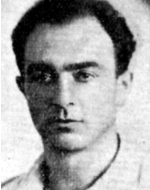Halperin, Asher
Son of-Batya and Avraham, was born at the beginning of 1910 in the town of Zborov, east of Galicia, Poland. He was known as a “prodigy” from his childhood. He was a talmid hakham and his rabbis in the Levov Yeshiva prophesied him greatness. After preparing for it during his free time, he successfully passed examinations at the English Gymnasium in Lwow, excelling in his studies, especially in Polish and German literature, and in classical literature. After obtaining a high school diploma, he continued to study and enrich his knowledge of literature. Who joined the Gordonia movement and trained in the cities of Kozlov and Nadvorna. When it was his turn to immigrate to Israel, he had to report to the Polish army. His parents offered to redeem him for money, but he refused to be released in this way. After completing his military service he immigrated to Israel in 1933 and settled with the first members of the “Gordonia” group in Hulda. He worked in the agriculture and took care of all the hardships and difficult tasks of establishing the agriculture. In 1936 he contracted typhus during the Great Plague. During the 1936-1939 riots he was a guard in the fields of Hulda. Who quickly learned the language and customs of the neighbors and knew how to stand up bravely and respectfully against the Arab robbers. In 1939, he spent some time in the Jaffa prison for retaliating against the Arabs of the nearby village. He served in Notarot and Hagana and completed various courses. In 1940 he was given the concentration of the field of flora, devoted himself to his studies in theory and practice by studying professional books, experiments and tours, soil tests, seeds and methods of processing. For a while he coordinated the section “Field Crops” in the monthly “HaSadeh” and published 17 articles. His extensive knowledge led him to the rank of instructor in the field and in 1942 he was elected to the center of the organization of workers in the orchards in Haifa. He often visited the farms and gave his knowledge to everyone in need. He was very attached to his family in Hulda, his wife and four children, but for the benefit of agriculture he often wandered in farms all over the country and participated in the study of the agricultural organization in the United States in 1946. Where he acquired sympathy and understanding for Israel and the Jewish struggle there. Returning from there he was full of information and began to prepare a book about agriculture in the United States, which was to be published by the Agricultural Center and the “Field”. When the War of Independence broke out, the group refused to allow him to join the army, because she needed all her people as a front-line, and he continued his work and defense in Hulda until his dying day. On May 25, 1948, the Egyptian enemy planes continuously bombarded the group with explosive and incendiary bombs, and in the course of its dedicated operation to extinguish the fire in the tractor shop, despite the dangers of the bombing, was injured and fell while fulfilling its duty. He was laid to rest in the cemetery in Hulda. He left a wife, Lina, and four children. To commemorate his memory, the library of the Ruppin Agricultural Academy was named for him and his two friends in the agricultural training.
